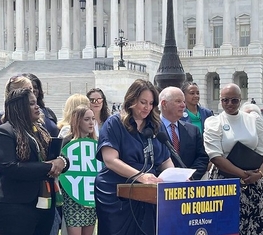Americans For Prosperity Foundation v. Bonta
Case Summary
The League of Women Voters of California and Common Cause, represented by the Campaign Legal Center and the Center for Responsibility and Ethics in Washington (CREW), filed an amicus brief supporting California’s law requiring non-profits to disclose donors on their tax returns.
California law requires charities to disclose the names and addresses of their donors when renewing their annual registration with the California Attorney General’s Office. The named plaintiff in this case, the Americans for Prosperity Foundation (AFP), was a charity that declined to file the paperwork that disclosed their donors’ names and addresses. The charity faced no penalties until 2010, when the Attorney General’s office increased enforcement of the disclosure requirement and threatened the plaintiff with fines and suspension of its registration.
AFP alleged the disclosure requirement violated its First Amendment rights and would make its donors less likely to contribute due to risk of retaliation against them. After several rounds of appeal and remand, the Ninth Circuit Court of Appeals ruled that the disclosure requirement did not violate the First Amendment because it promoted investigative efficiency and effectiveness while not burdening donors’ associational rights.
The plaintiffs appealed to the US Supreme Court. The League of Women Voters of California and Common Cause, represented by the Campaign Legal Center and the Center for Responsibility and Ethics in Washington (CREW), filed an amicus brief urging the Court to uphold California’s law. Our amicus brief argued that donor information provided to the Attorney General’s Office was not publicly disclosed; on the contrary, it was kept confidential due to a new internal policy. Furthermore, our brief asserted that, even if donor information was disclosed, the plaintiffs’ claims of injury or chilling effect upon their donors’ speech was highly speculative.
The Court ruled against California, holding that California’s law was insufficiently tailored to address the state’s interest in investigational efficiency, was overbroad, and burdened donors’ associational rights.
LWV Timeline
Plaintiff Americans for Prosperity Foundation files complaint
Americans for Prosperity Foundation files a complaint in the US District Court for the Central District of California, alleging disclosure of its donors’ information to the California Attorney General violated the First Amendment.
District Court issues preliminary injunction
The District Court issues a preliminary injunction, finding the disclosure requirement burdened the plaintiff's First Amendment rights and that the case was almost identical to another pending case in which the Ninth Circuit issued an injunction pending appeal.
Ninth Circuit reverses District Court decision
The Ninth Circuit rules that the District Court abused its discretion, reversed the District Court’s preliminary injunction, and ordered it to enter a new order allowing the Attorney General’s office to collect the donor information for law enforcement purposes.
District Court issues permanent injunction
On remand, the District Court issues a permanent injunction forbidding enforcement of the disclosure requirement, on the grounds it failed to serve a sufficiently important government interest and chilled the plaintiffs’ First Amendment rights by exposing them to harassment, as the state was unable to keep the information confidential, as it was required to.
Ninth Circuit reverses District Court’s permanent injunction
The Ninth Circuit Court of Appeals reverses the permanent injunction, finding the state’s interest in preventing charity fraud justified the disclosure, and that there was little risk of burdening First Amendment rights, as the risk of inadvertent disclosure of the information was slight.
League files amicus brief
The League of Women Voters of California and Common Cause, represented by Campaign Legal Center and CREW, file an amicus brief to uphold California’s law requiring nonprofits to disclose their donors on their tax returns.
US Supreme Court issues opinion
The Court rules that California’s disclosure requirements did not satisfy strict scrutiny and violated the First Amendment.





